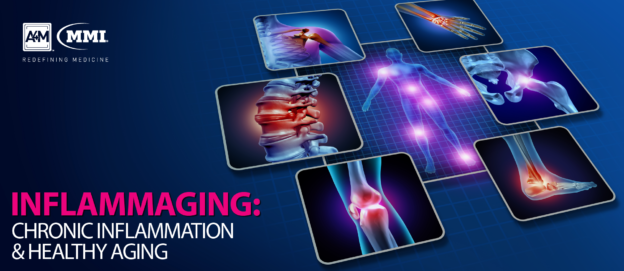In recent years, the scientific community has been increasingly focused on a rarely recognized yet widely prevalent condition that contributes to an array of diseases, including cardiometabolic diseases, arthritis, Alzheimer’s, and depression. Chronic inflammation, although it may progress slowly, is the root cause of most chronic diseases and poses a significant threat to public health and longevity.
Trending in many medical specialities chronic, low-grade inflammation associated with changes in stem cell structure and deterioration is being referred to as “inflammaging”. The condition, which often results from an accumulation of health risk factors such as environmental causes, dietary habits, UV exposure, and sleep patterns, is linked to a number of age-related diseases – including diabetes, cardiovascular disease, and cancer. To delay and support healthy aging while protecting the body from illness, medical experts continue to investigate the prominent role of chronic inflammation and its implications on the development of anti-aging therapies.
Causes of Chronic Inflammation
Current literature has identified several underlying molecular causes of the phenomenon of inflammaging. The condition stems from a failure of the immune system to mitigate responses to illness or injury; factors can include the body’s failure to eliminate bacterium or fungus, exposure to a toxic substance, or the presence of an autoimmune condition. With age, immune responses tend to become less well-regulated and thus, may result in consistently elevated levels of inflammatory agents such as C-reactive protein, chemokines, interleukin-6 (IL-6), and tumor necrosis factor-a.
Further, inflammaging can have a direct impact on skin health and vitality. Chronic oxidative stress can cause accelerated tissue damage, weakening skin structure and leading to the breakdown of elastin and collagen, ultimately impairing the skin’s barrier function. This contributes to the development of many unwanted dermatologic symptoms – wrinkles, hyperpigmentation, uneven skin tone, and textural changes.
Preventative Techniques
As chronic inflammation is difficult to treat, employing adequate preventative measures is of utmost importance. Improving overall health by maintaining a balanced diet, regular physical activity, and consistent sleep patterns can be beneficial to supporting optimal functioning of stem cells in the body.
Highly processed foods contribute to the inflammatory response, increasing the risk of and worsening existing chronic inflammation. On the other hand, consuming a diet rich with anti-inflammatory foods – high in nutrient–dense vegetables, fruit, and unprocessed foods – can aid the body in regulating the immune response which becomes more challenging with age.
Additionally, experts emphasize the role of the gut microbiome in preventing chronic inflammation; research has found that the gut microbiota of elderly patients often has decreased diversity, leading to weakened barriers against bacteria and thus, increased risk and prevalence of chronic inflammation. To help maintain gut health it is recommended to increase the consumption of probiotic-rich foods – yogurt, kefir, and fermented products – and maintain a well-rounded diet.
Another important preventative measure to consider is the routine and careful use of sunscreen to protect the body against harmful UV exposure, which drives pro-inflammaging factors. To aid this, skincare products with the right ingredients can shield skin stem cells from the negative effects of environmental stressors and break the cycle of inflammaging.
While knowledge in the relatively novel field of inflammaging is continuously expanding, the role of chronic inflammation in the biological aging process and development of age-related disease has become well-known. Clinicians looking to gain a better understanding of current clinical evidence and strategies for targeting inflammatory activity are invited to attend the Inflammaging – Ways to Slow the Clock session taking place during our Longevity, Aging, and Immuno Competency Virtual Event.



